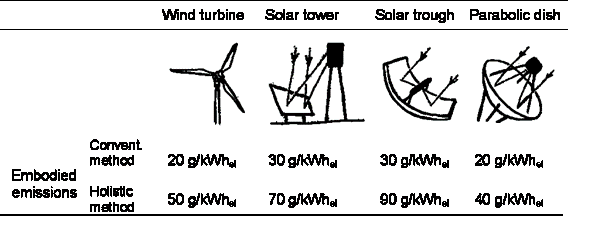Hybrid Life-Cycle Assessments (LCAs) combine input-output analysis with process analysis. By taking this approach, on-site, first- and second-order process data on environmental impacts may be collected for the product or service system under study, while higher-order requirements are covered by input-output analysis.
‘Conventional’ LCAs are based only on process analysis approach, meaning that only on-site, most first-order, and some second-order impacts are considered. However, the truncation of the system boundary leads to a significant underestimation of the true impact (see the boundary problem). Using input-output analysis, the error caused by this truncation can be avoided. A comparative example is given in the table below: Embodied emissions are at least twice as much when comparing the conventional LCA method with the holistic, hybrid input-output analysis approach.

Our LCA projects have been commissioned by various stakeholders, such as industry, government agencies, NGOs and research institutions. We have carried out LCA projects have been carried for:
- Water service providers;
- Food industry;
- Manufacturing industry;
- Waste management;
- Energy sector and
- Electronic industry.
We offer:
- Life Cycle Assessment studies based on hybrid, process and input-output approach depending on the specific needs of the client
- Life Cycle Costing studies and
- Life Cycle Engineering studies.
For more information – Contact us for copies of articles on life-cycle assessment of energy supply systems:
- Lenzen M and Wachsmann U, Wind energy converters in Brazil and Germany: an example for geographical variability in LCA, Applied Energy, in press, 2003.
- Lenzen M and Munksgaard J, Energy and CO2 life-cycle analyses of wind turbines – review and applications, Renewable Energy 26 (3), 339-362, 2002.
- Dey C and Lenzen M, Greenhouse gas analysis of electricity generation systems, ANZSES Solar 2000 Conference, Griffith University, Brisbane, Australia, 2000.
- Lenzen M, Greenhouse gas analysis of solar-thermal electricity generation, Solar Energy 65 (6), 353-368, 1999.
